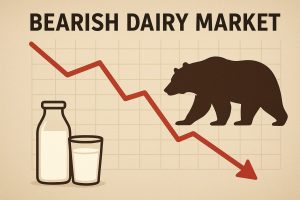
At World Dairy Expo in Madison, Wisconsin, on Thursday, a coalition of dairy farmers and advocacy groups, including the American Business Immigration Coalition, held a press conference to demand the passage of a Senate bill that would legalize the nation’s immigrant agricultural workforce in year-round jobs.
By some estimates, 80% of the labor on Wisconsin dairy farms is now performed by immigrants. Most of them are undocumented, since there is no visa program for year-round low-skilled agricultural jobs.
As the president of Wisconsin’s Edge Dairy Co-op Brody Stapel put it, “There are not either enough local workers or not enough willing workers to fill these labor-heavy jobs. And farmers have tried everything.”
The House passed the Farm Workforce Modernization Act last spring, with broad bipartisan support. Among other provisions, the bill creates a visa program for immigrant farmworkers who stay in the U.S. year-round.
Senate sponsors of the legislation– Democratic Sen. Michael Bennet of Colorado and Republican Sen. Mike Crapo of Idaho – have been working on their version for over a year as they struggle with controversial provisions, NPR reported in July. Among the sticking points is a provision that expands labor protections under the Migrant and Seasonal Agriculture Workers Protections Act, which could allow farmworkers to sue their employers. The American Farm Bureau Federation opposes that provision.
Meanwhile, immigrant rights groups have raised concerns that the bill expands the H-2A temporary agricultural visa program in ways that increase immigration enforcement and give employers more power over their workers. Since employers hold their employees’ documents, effectively trapping them in situations that could be exploitative.
Christine Neumann-Ortiz of the Wisconsin-based immigrant workers’ rights group Voces de la Frontera, told the Wisconsin Examiner last year that an earlier version of the bill “turned employers into ICE agents,” and that farm workers were better off under a system in which they use false documents, giving them the flexibility to escape abusive employers.
At the World Dairy Expo press conference, Stapel said the legislation is “not perfect,” noting that his group would prefer to lift the cap on the number of year-round workers who can apply for a visa. But, he said, “it’s a great start.”
Walt More, a Pennsylvania dairy farmer and president of the American Dairy Coalition, called the severe labor shortage facing dairy farmers throughout the U.S. a “crisis,” and warned that the difficulty finding workers jeopardizes the nation’s food supply.
“At our farm, not having enough qualified, dependable labor has negatively impacted our business by curbing expansion and not always getting jobs done on a timely and routine basis,” he said.
“The labor shortage has negatively affected overall milk and crop production as well as hurt health,” More added. He urged the Senate to “do your part and fix the labor shortage this year, so the grocery shelves remain stocked and food inflation reduces.”
Farmers at the World Dairy Expo warned of a looming agricultural trade deficit as U.S. farms go out of business and the nation increasingly relies on imported food.
“My friends food security is national security. A nation that cannot feed itself is not secure,” said Steve Obert, executive director of the Indiana Dairy Producers, who milks 500 cows in southwest Indiana.
“If the Senate and Congress don’t fix this, dairy farms in Indiana, and Wisconsin and all across the country will shut down their operations,” Obert warned.
Nationwide, immigrant workers make up nearly 75% of the dairy farm workforce, Obert said. “That high percentage is not because they are lower cost employees,” he added. “It is because they are willing to do the work of feeding, milking and caring for our dairy cows.”
“Most dairy farm families care deeply about their employees,” Obert added, He noted that, while undocumented workers pay income and Social Security taxes through withholdings from their paychecks, they will never draw Social Security benefits.
“In conversations I have with farmers from across the country. I hear the same thing — the No. 1 concern I hear is that when it comes to growing and maintaining a healthy dairy industry, we need labor,” said Randy Kohler, Wisconsin dairy farmer and leader of Dairy Farmers of America. Dairy is a $45.6 billion industry, Kohler pointed out. “It’s more than the Florida citrus crop and Idaho’s potato crop put together, and 23% of us dairy farmers are in Wisconsin.”
Kohler pleaded with Wisconsin Sens. Ron Johnson and Tammy Baldwin, “please support our industry now.”
“We believe that any agricultural labor reform solution for dairy needs to both protect our current workers and allow very meaningful access to a guest worker program,” he said.
The Food Chain Workers Alliance, meanwhile, opposes the current legislation and is calling on Congress to instead pass a bill that includes “citizenship, fair wages and better protections for all farmworkers.”






















